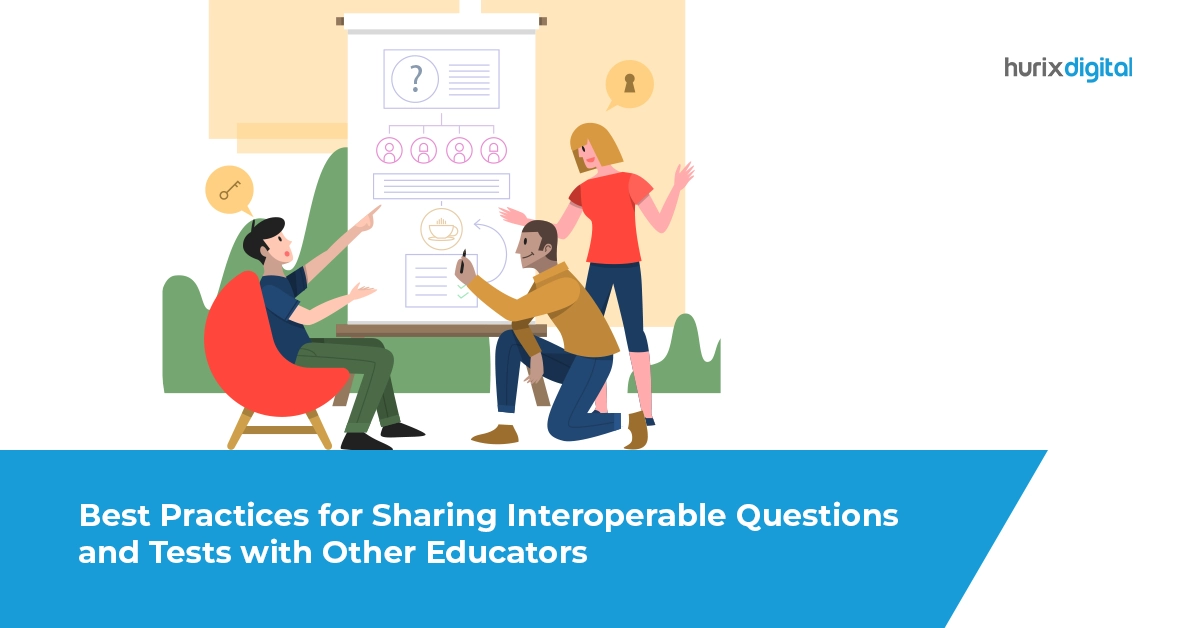Summary
This post provides a brief overview of QTI. It has outlined the importance of QTI and the benefits of QTI for educators. It has also outlined the best practices for sharing interoperable questions and tests with other educators.
In the current education landscape, educators constantly seek innovative ways to enhance learning experiences and streamline their workflow. One of the ways this is happening is by exchanging resources and collaborating on different aspects of creating educational content.
One aspect that educators collaborate on is assignments and tests, which are often in different formats, making it difficult to collaborate on different Learning Management Platforms (LMS) or assessment platforms. This is where the concept of QTI, or Question and Test Interoperability, emerges as a game changer.
In this post, we will discuss how to effectively share interoperable questions and tests using QTI, boosting seamless collaboration among educators. Let’s start!
Table of Contents:
- What is QTI?
- Why is the QTI Standard Important for Educators?
- Six Benefits of Sharing Interoperable Questions and Tests
- Seven Best Practices for Interoperable Question Sharing
- Conclusion
What is QTI?
QTI (Question and Test Interoperability) is a standard developed and maintained by 1EdTech (formerly IMS Global Learning Consortium) and provides a standardized language and format for representing and exchanging assessment items. This enables questions and tests to be utilized on diverse platforms and systems, making the process flexible and improving interoperability.
QTI format encapsulates several frameworks that include questions, answers, and metadata, ensuring that assessments can seamlessly transition from one platform to another. This interoperability, facilitated by QTI, eliminates the barriers that once hindered the exchange of assessment content.
Why is QTI Standard Important for Educators?
The importance of the QTI standard lies in its ability to address several key challenges faced by educators. These include:
1. Consistency of Data
Traditionally, assessment data has been trapped within individual platforms, hindering collaboration and hindering the development of comprehensive student profiles. QTI Authoring Tools facilitates the seamless exchange of data between systems, allowing educators to gain a holistic understanding of student progress.
2. Addresses Inefficiencies in Assessment Development
Creating high-quality assessments can be a time-consuming and resource-intensive process. QTI standards promote the sharing and reuse of existing resources, allowing educators to focus their efforts on developing new and innovative assessments.
3. Improves Accessibility
The lack of standardized formats often creates barriers for educators who require specific accessibility features. QTI ensures that assessments are accessible to all learners, regardless of their abilities.
4. Consistent Data Reporting
Non-standardized formats can lead to inconsistencies in data reporting, making it difficult to compare results across different platforms. QTI assessments guarantee consistent data representation, enabling reliable and accurate assessment reporting.
5. Enhanced Adaptability to Diverse Learning Environments
With institutions and instructors utilizing various tools and systems, there is a need to allow for adaptability in diverse learning environments. QTI ensures that assessment content remains adaptable across these diverse environments.
Whether in traditional classrooms or virtual settings, educators can confidently deploy assessments seamlessly. This adaptability is especially crucial in today’s hybrid and online learning environments.
Also Read: Top 10 Inclusive Teaching Best Practices That Are Effective
Six Benefits of Sharing Interoperable Questions and Tests
The latest QTI Assessment Tool is the QTI 3.0 version, which addresses several limitations with earlier versions like QTI 2.1 or APIP 1.0. The additional features of QTI 3.0 help you gain several benefits, such as:
- Improved interoperability and consistency
- Support for HTML 5.0 and other web-friendly markups
- Access to a wider pool of diverse questions enriches student learning and addresses individual needs and learning styles
- Standardized data and test formats that enable efficient data aggregation and analysis, providing valuable insights into student performance
- Sharing questions aligned with common QTI standards to promote consistency and comparability across different educational institutions.
- QTI 3.0 ensures that assessments are compatible with assistive technologies, making them accessible to students with disabilities.
Seven Best Practices for Interoperable Question Sharing
Having covered all you need to know about the QTI format, let’s now explore the essential best practices for educators to implement this approach effectively:
1. Embrace Open Standards and Frameworks
Utilize the QTI standard as the primary format for creating and sharing questions and assessments, ensuring that it is easy to share across formats and can work with multiple systems and platforms.
For developing new content or if you are migrating to a new LMS platform, consider open-source platforms and tools designed to support the creation and exchange of QTI-compliant resources.
2. Leverage Authoring and Sharing Tools
Choose user-friendly platforms with features designed for collaborative question creation, review, and sharing.
3. Enable Version Control
Implement version control mechanisms to track changes and maintain a history of question revisions.
4. Utilize Metadata Features
Leverage metadata fields to tag questions with relevant information, such as learning objectives, difficulty levels, and accessibility features.
5. Educate Users on Data Practices
Provide clear and transparent information to users regarding data collection, storage, and usage practices.
6. Peer Review and Feedback
Implement processes for peer review and feedback to ensure the quality and validity of shared questions.
7. Implement Robust Security Protocols
Utilize encryption and access controls to protect sensitive student data and prevent unauthorized access.
Also Read: Best Practices and Expectations for Online Teaching
Conclusion
As we stand at the precipice of a new era in educational assessments, the potential of interoperable questions and tests lies before us, brimming with promise. By embracing this transformative approach, educators can collaborate seamlessly, share resources efficiently, and ultimately elevate the learning experience for all students.
If you are looking to create interoperable and highly accessible assessments and tests for your curriculum, partner with the experts at Hurix Digital. With over 22 years of experience in educational technology, we are committed to empowering educators with innovative solutions that transform teaching and learning.
Our latest platform, Dictera, embodies our dedication to interoperability and collaboration. This AI-enabled platform helps you automate your assessment processes, from creating, sharing, and managing interoperable assessments by seamlessly integrating with existing systems and tools.
Book a free trial for more details!











